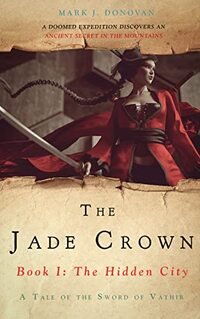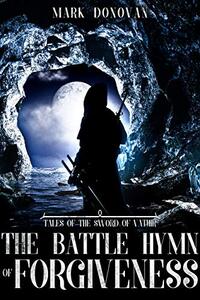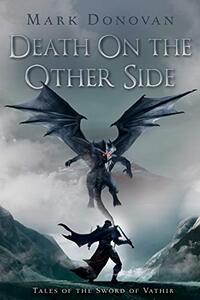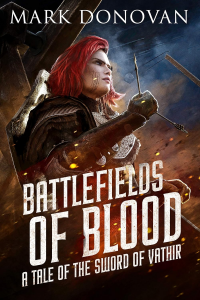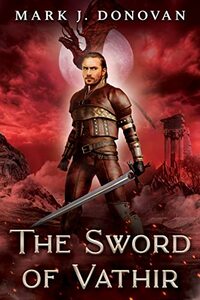Mark J. Donovan Interview Published on: 01, Aug 2023
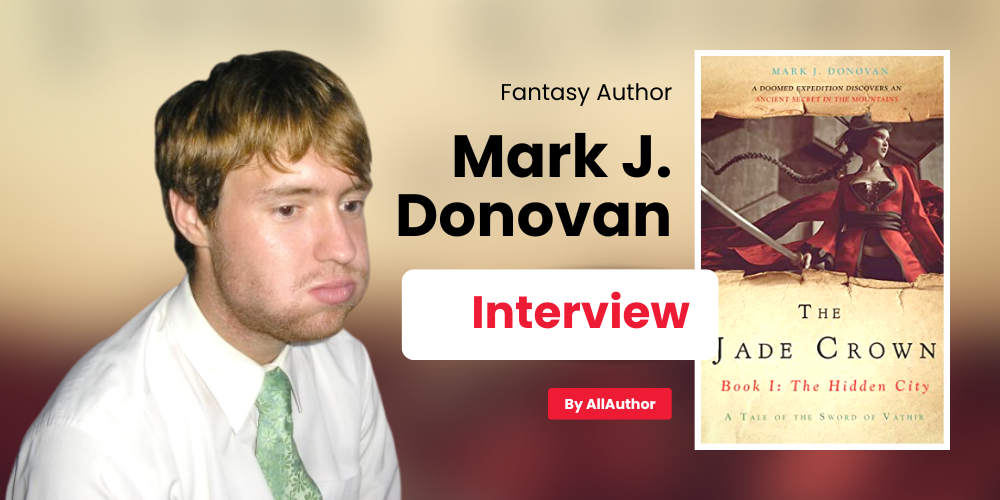 Do you have a simple childhood memory that you could never forget?
Do you have a simple childhood memory that you could never forget?
I remember when I was two or three years old, living in a mobile home, wandering out in the desert with my older brother and sister. In my mind, we were miles away from home; but in reality it was probably just a few yards.
Do you think it’s important for parents to read for their children?No; I think the children should learn how to read for themselves.
Are there any real-life experiences or events that have influenced your writing in unexpected ways?None that come readily to mind.
How did you get started in writing, and what inspired you to create the Sword of Vathir series?I wrote my first novel when I was eight years old. It was theoretically based off an old board game called Hero Quest, but it was mostly a whole-sale rip off of the Taron Wanderer series which I had just started reading; and then I just inserted all of my friends from school into it. So obviously it was brilliant.
I started writing the Sword of Vathir because I was wanted to write something that I could eventually turn into a video game. But since the books have been such a massive failure, don't expect to see that game any time soon.
The tagline "born somewhere, lives somewhere else, and will eventually die in some other place" is intriguing. Can you elaborate on its significance and how it relates to your writing or personal philosophy?Nope! That was sort of the point.
What elements or themes can readers expect to find in the Sword of Vathir series? Is there a central message or idea that you hope to convey through your writing?Overall I would say the most common theme that recurs is that no one is ever as bad as we think they are, but also never as good. I don't know; I feel like our world has lost the ability to view dissenting opinions with any amount of compassion or empathy. Which is dumb, because forcing someone to think the same way you do is not only impossible, but also maybe the simplest representation of evil I can think of. And we can't just go around killing people just because they disagree with us. So we have to learn how to keep living together. Does that mean that my books are maybe the only things on earth that can save our civilization? ...Yes. Yes it does.
Creating a novel or a series can be a significant undertaking. How do you approach the writing process, and what techniques or methods do you use to keep yourself motivated and productive?The motivation is the hardest right now, because so far I have only lost money by trying to market and promote my books; which means that they are basically no different than a hobby. And its hard in limited free time to want to do something that's only going to waste more of my money. But my writing process is simple: If you have a good understanding of the characters, then you will know how they are going to react to whatever scenario you place them in. So I pick up Garruth, drop him in a story, and let the characters' decisions lead me to the end of it.
Do you have a favorite character or scene from the Sword of Vathir series? If so, what makes them special to you?Well, probably Garruth since he's in every single one of them. But other than him, I actually had the most fun writing a character in the very first novel I wrote for the series, but haven't released yet because it turned into a gigantic mess. I'm planning on using it in the series that finally ends Garruth's story, when I get to it in forty or fifty thousand years. But the character is named Thomas Peddington. He was a self-important, self-obsessed butler who thought and spoke like a bad impression of a Charles Dickens book. Just, never using one word when ten will do, and talking himself in circles. It was fun to write. Will it be fun to read? Not if previous sales are any indication of future events!
As an author, how do you handle criticism and feedback from readers or reviewers? Has feedback ever influenced your writing style or future projects?The most helpful feedback I ever get is questions, because I don't write the stories to be ambiguous; so if someone doesn't understand how, or why something happened - or even what it was that happened - that means that I screwed up. As far as negative criticism...honestly? I could not care less. I write the books for myself, because I enjoy doing it and I enjoy the characters and the stories they create. I believe that they are good enough to eventually find the right audience, and if someone disagrees I have great news for them: there are literally millions of other books by other authors they can read. There's never been more books than there are now. So if they don't like mine, I don't worry about it. Someone will, eventually. Maybe. Hopefully.
How important is world-building in the Sword of Vathir series, and how do you go about creating a rich and immersive fictional world for your readers?That's a little harder to answer than you might think, because my stories take place over the course of thousands of years. Because of the enchantments on the main character's sword, he doesn't age or grow old the way most people do. Which is great, because it means I can basically do anything I want with the character. But it also means that almost every story is taking placing in a completely different "world" than the others. And I've found that creating really detailed, specific rules can actually make the world seem smaller, rather than larger. For example, when I first started writing the books I set about to create a single, unifying religion like most fantasy series have. But I quickly lost interest in it, because it didn't feel authentic. I will never be able to authentically capture the nuance of generations of history and culture, and attempting to do so will only end up seeming hollow. Besides which, the Religion is not integral to the stories. Its about the people and the characters, and their choices. Besides, there is no ONE religion in the real world. There have been thousands of them, which ebb and flow with the passage of time and the death of one society or culture, which births another. So instead I scrapped it, and just come up with something new every time I need to. And then I keep the descriptions simple: I only talk about the specifics that the reader needs to know for the story, which implies that there's even more not being said. Then they create the rest of it on their own, which makes it seem more real for them. Also, it saves me a lot of work.
The not-dying streak mentioned in your tagline adds an interesting twist to promoting your books. Can you share more about how this concept came about and how it's been received by your readers and the writing community?Well, it was basically a joke. The character is sort of immortal: he can be killed, but he doesn't grow old anymore. That was something I hit on early in my creation of the character, because I wanted to do a medieval sort of Justified, the show based on the Elmore Leonard stories. Which meant I needed a character that would have a new place, a new job, a new story every time; so I made him a mercenary. But then, why do we care about this mercenary? He needs something unique, something that sets him apart. Eventually I settled on the idea that his sword was accidentally enchanted to give him a kind of never-ending life. Which was intriguing to me, because - as I said in an earlier answer - it means I can basically do whatever I want with the character. I could drop him into a sci-fi story if I wanted without breaking the rules of the books. But I won't; probably.
Apart from writing, do you have any other passions or hobbies that influence your storytelling or help you unwind during the creative process?I play a lot of basketball, and that is actually important to the writing: because I try and write the combat sequences the way basketball players discuss footwork and body positioning, and all of the other little things that make a specific motion either succeed or fail. It is also an easy way to understand Garruth's point of view in many cases: because often he is not anyone's enemy. He's just a mercenary, hired by one person to complete a task which puts him at odds with someone else. So many times he views the antagonists not as evil monsters that need to be slain, but as competition. As a competitor he wants to win; its just that many times, in his field of competition, that often means that the loser is going to die. So he's sort of a professional athlete and a soldier at the same time.
Writing a series involves continuity and character development over time. How do you ensure consistency throughout your books, and do you ever find it challenging to maintain that consistency?That's actually pretty easy for me: because there is very little continuity from one book to another. Each short story or book, or series of books, is separate from the others - except for the fact that Garruth is involved. So the only real continuity I need is the basic geographic outline of the continent, and Garruth's character and personality. The rest can be basically whatever the story needs it to be. And for everything else, that's what beta readers are far. Readers are far more effective at catching continuity errors, because they can only see what's on the page - unlike the writer, who sees it in their head and is just trying to convey as much of what's up there as they can onto the page.
As you continue to work on the Sword of Vathir series, are there any upcoming projects or plans that you can share with your fans?I am planning on two more books in The Jade Crown mini-series: The Cursed Temple and The Golden Valley. After which I will begin work on another mini-series that continues after the events of The Sword of Vathir novella. I'm planning on calling that miniseries The Black Falcons.
How has your experience working with AllAuthor been?So far so good...How are you?
Share Mark J. Donovan's interview
Mark J. Donovan is an enigmatic author whose life spans across different places but is united by his passion for storytelling. As he embarks on his literary journey, Mark is weaving the captivating tales of the Sword of Vathir series - a collection of novels and short stories that transport readers to fantastical realms filled with adventure, mystery, and magic. With a penchant for crafting immersive narratives, Mark's words breathe life into vibrant characters and intricate worlds.

